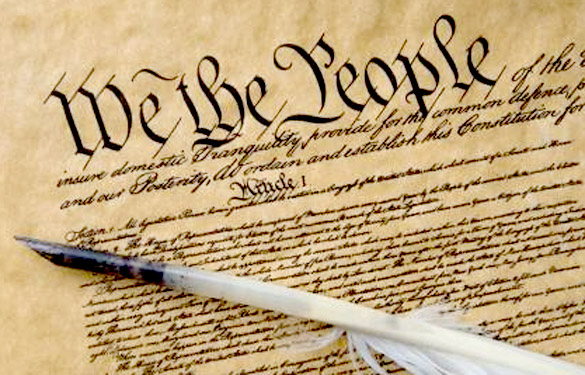Every year there are dozens of scholarly books and articles that are published describing the founding period of the United States. The debate between Federalists and Anti-Federalists over the ratification of the Constitution is one of the topics often discussed. Both the Federalists and the Anti-Federalists presented arguments that have had profound effects on subsequent American history. It is important for us to learn the full nature of their debate and how it has influenced our views on American government.

“Nothing is more certain than the indispensable necessity of government, and it is equally undeniable, that whenever and however it is instituted, the people must cede to it some of their natural rights in order to vest it with requisite powers.”1 Federalists, the supporters of the Constitution, had the support of some of the most prominent men in America, including Benjamin Franklin and George Washington. Moreover, prominent political philosophers of their time, such as Alexander Hamilton, James Madison, and John Jay, published a series of essays under a pseudonym “Publius.” These essays were widely published in newspapers throughout the nation. They explained the meaning and the virtues of the Constitution and countered the powerful arguments of the opposing side. Today, they are known as The Federalist Papers. These documents are important American contributions to modern political theory.2

Patrick Henry, a famous Anti-Federalist, was well known for his quote, “I know not what others may choose but, as for me, give me liberty or give me death!” In order to combat the attention given to those who had different opinions, the Federalists deemed their opponents as “Anti-federalists,” giving the message that individuals that were not associated with the Federalists had nothing to offer besides negative opposition and chaos. However, Anti-Federalists did have serious and intelligent arguments of their own. They presented themselves as the loyal defenders of the principles of the Revolution. Moreover, they believed that the Constitution would betray the principles of freedom by establishing a tyrannical central power in the new government.
The main claims of Anti-Federalists were that a federal government would make unfair distinction among the citizens, raise taxes, abolish the states, and end individual liberties.3 According to them “the constitution was the basic mistrust of human nature and the capacity of human beings to wield power.”4. They believed the Constitution lacked a much needed Bill of Rights, a concern that became one of the most important sources of their opposition, with at least nine out of ten Anti-Federalists wanting a written Bill of Rights.5

At the heart of the debate between Federalists and Anti-Federalists was a battle between two fears. The Federalists were afraid of disorder, anarchy, and chaos; they believed that a constitution would prevent these catastrophic events. The Anti-Federalists were not anarchists and they too recognized the need for an effective government; they believed that the greatest threat to the future of the United States was the government’s potential to become corrupt and seize more power until its tyrannical hand stretched across the country and completely dominated the citizens.6
Despite the Anti-Federalist efforts, the Constitution was ratified in 1790, but during the ratification debate, Madison conceded that a bill of rights was needed. Federalists assured that the first step of the new government would be adopting a bill of rights.
- John Jay, Federalist Papers no 2, (1787), 1. ↵
- Alan Brinkley, American History: Connecting with the Past Volume 2, 15 edition (New York: McGraw-Hill Education, 2014), 145. ↵
- Alan Brinkley, American History: Connecting with the Past Volume 2, 15 edition (New York: McGraw-Hill Education, 2014), 146. ↵
- Alan Brinkley, American History: Connecting with the Past Volume 2, 15 edition (New York: McGraw-Hill Education, 2014), 146 ↵
- Main T. Jackson, The Antifederalists: Critics of the Constitution, 1781-1788 (New York: W.W. Norton, 1974), 159. ↵
- John H. Aldric and Ruth W. Grant, “The Antifederalists, the First Congress, and the First Parties,” The Journal of Politics, vol 55 no. 2 (1993): 295. ↵



71 comments
Alexis Soto
This is a great reading presenting the opposing views of the Federalist and Anti-Federalists. Its interesting to note that even at the founding of the United Sates political discussion was already under way. Current views regarding state and federal power have their origins from our founding fathers and have helped shape some of the most important moments of U.S history. Each group, the federalist and anti-federalists presented well reasoned and articulated arguments and only help to remind us that even our founders had differing views on the direction the government should go.
Irene Astran
The Federalist Papers persuaded a great deal of the citizens at the time when states were being asked to ratify the Constitution. If you take a look at their work you will see that they went into great detail to assure the states a degree of autonomy. They convinced most that the Constitution would bring order to the nation. The Bill of Rights was thrown into the mix to provide safeguards for citizens against the national government which must have looked very promising.
Yesenia Cardenas
Well written article. If the founding fathers believed that this debate was going to be less heated in the future, they would be so wrong. Even today, people have heated debates all the time as to the size and function of an ideal federal government.
Tina Valdez
The Federalists feared disorder but the anti-federalists did not want to see the United States government become corrupt. Although there were obvious differences you article reminds readers of the fact that both wanted the best for their country. I enjoyed reading your article and your insight.
Aaron Jaramillo
Great article and great job in comparing and contrasting the two sides. As I read your article I founded interesting that our political system has been divided into two sides from the beginning. They were I believe two side that were really after the same thing in two different ways. At the end, they both really got a bit of what they were looking for, the Federalists with the Constitution and the Anti-Federalist the Bill of Rights. Great article.
Salvador Rodriguez Gomez
Looks like even before the US and it’s government was established, there has been a divide in political ideas and how a country should be run. Your article fantastically shows the two different sides and their viewpoints as well as the resulting constitution and how it was a compromise of both sides.
George Manzanares
Nicely done! I never imagine that the Bill of Rights would spur such a controversy in the early American period. Well done on illustrating what the federalist and anti-federalist both stood for. Furthermore, great choice of images!
Maalik Stansbury
I hardly knew anything about this topic. I agree witht eh commenter. It is crazy that our politics have sides and are split to a certain point in which it becomes a rival versus being separate but equal or separated working towards the same goal in mind. It reminds me of honestly of how our politics are now. I think you did a fantastic job describing and explaining the federalist as a whole.
Andres Palacios
It was a very well written article. I also liked and enjoyed the way you were able to compare the ideologies of both parties in a simple understandable way. Excellent job.
Mariana Sandoval
You did a really nice job comparing and contrasting Federalists vs. Anti-federalists in a clear and concise way. I liked your use of the appropriate quotes that captured the mentality from both sides really well.